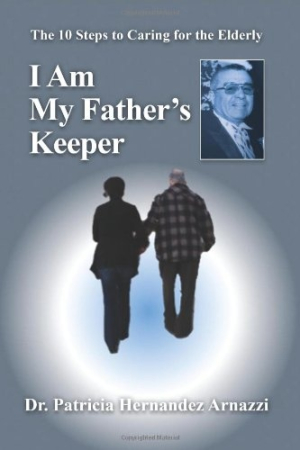I Am My Father's Keeper
The 10 Steps to Caring for the Elderly
Taking on caregiving responsibilities for a parent with Alzheimer’s disease can be exhausting both physically and emotionally, but it can also make a person stronger, so believes Patricia Hernandez Arnazzi, author of I Am My Father’s Keeper.
Trained as a medical doctor, Arnazzi finds herself in a new role after her father is diagnosed with Alzheimer’s. Rather than an advisor to patients, she is part of her family’s caregiving team. In her book, she articulates the kind of advocacy and self care required to stay healthy and sane during such an experience.
She presents the material in “10 steps,” but these are different aspects of caregiving, as opposed to a progression. For example, they include the importance of a healthy attitude, being aware of supportive resources, pushing for more research, and dealing with a parent’s last days. The chapters fit together well, creating a 10-part system for caregiving that serves as a reminder of what’s most important during the process.
Because of her background, Arnazzi is very adept at explaining health concepts and encouraging readers to draw on resources like the Alzheimer’s Foundation of America. Friendly and direct, she strikes the tone of a trusted doctor attempting to comfort and empower.
While providing valuable advice on healthcare issues, Arnazzi shines brightest when she relays her own stories about caring for her father, especially alongside her mother. For many, family dynamics can become particularly thorny in the midst of a long-term medical crisis, and Arnazzi’s family is no exception.
She’s honest about the times that she lashes out or acts poorly because of fatigue or frustration. Her anecdotes will resonate with anyone who’s been a caregiver, even for a short amount of time, and they give Arnazzi’s advice even more authoritative weight. Most of all, she expertly describes why she devoted years to her father’s care rather than leaving it up to the staff of an assisted-care facility or solely in the hands of her mother.
“I feel so fortunate to have had the opportunity to [care for] a man who sacrificed all he had to give his children all the advantages he never had,” she writes.
Although Arnazzi’s experience is related most directly to caring for a parent with a specific set of conditions—a stroke, followed by Alzheimer’s—her advice will be invaluable to anyone who provides care for the elderly.
In addition to sharing stories about her struggles and triumphs, Arnazzi delivers straightforward insights. For example, in encouraging readers to discover humor in the midst of a crisis, she advises: “Make time to play with children. Their innocence and spontaneity will make smiling easier.” Every chapter has similar short items as summation, and they provide excellent guidance and reminders to stay grateful, loving, and positive whenever possible.
By sharing her stories, including those exposing moments of frustration or fear, Arnazzi delivers a much-needed guide to navigating painful situations. Her optimism is uplifting, and anyone can learn from her belief that “it is what a heart filled with gratitude allows us to see that is important.”
Reviewed by
Elizabeth Millard
Disclosure: This article is not an endorsement, but a review. The publisher of this book provided free copies of the book and paid a small fee to have their book reviewed by a professional reviewer. Foreword Reviews and Clarion Reviews make no guarantee that the publisher will receive a positive review. Foreword Magazine, Inc. is disclosing this in accordance with the Federal Trade Commission’s 16 CFR, Part 255.

